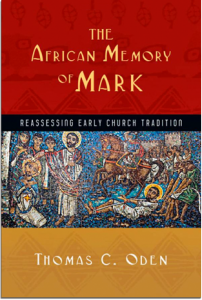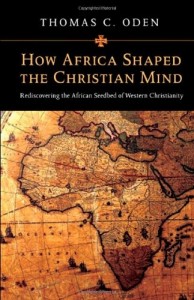Rethinking the Early Church: Mark the Apostle to Africa and His Role in the NT (Ruminations on T. C. Oden African Memory of Mark)
Author: Bobby Valentine | Filed under: Africa, Black History, Books, Church History, Mark, Race Relations, UnityIf I said, “Close your eyes. Now imagine the early church.” What picture would come into your mind? The more I read Scripture and the writings of early Christianity I suspect the image I have had is wrong.
For two hundred years, perhaps longer, the image of Christianity in the West has been very European. The Enlightenment has produced some wonderful results for which we are all grateful. But the Enlightenment has also produced unbelievably negative ideas as well. Perhaps the greatest heresy of the Enlightenment has been to impose a way of thinking and viewing the world onto the Scripture and the world of the Bible.
Interestingly enough historical and critical scholarship has since World War II, but especially since the 1960s, rediscovered the Jewish world of the early church. But it is not just the Jewish world but Eastern and African. This Jewish/Eastern and African orientation of Christianity was taken for granted prior to the Enlightenment. While today many think of Christianity as a European, or worse a white, religion this has very little basis in reality for the first thousand years of the history of the church. For example the Seven Ecumenical Councils, that define most of historic Christianity, not one took place on the European continent. Of the great Church Fathers a large number were from Africa (Clement of Alexandria, Origen, Tertullian, Athanasius, Augustine, etc).
Thomas C. Oden, a repentant Modernist, has been producing wonderful works on the early church. He edited The Ancient Christian Commentary which brings together Patristic commentary on the whole Bible. Now late in his career he directs the Center for the Study of Early African Christianity at Eastern University. His journey has led him to the conviction that the traditions of the early church are reliable and shed a great deal of light Scripture and simply understanding our faith. Oden laid down a gauntlet for biblical scholars and historians alike in his How Africa Shaped the Christian Mind and has continued to press the issue sense in articles, lectures and books. The African story has not only suffered because of the Enlightenment but because the Islamic conquest cut off much of the Christian world from the West
The African Memory of Mark
Recognizing that not only is modernity passed but western intellectual dominance is waning, Thomas Oden offers The African Memory of
Mark (click Amazon link) as an act of, what he calls, profound empathy. Oden taps into a two thousand year old exegetical tradition that is, for the most part, foreign to moderns and westerners. This tradition states, with pride, that Mark was the “apostle” (as much an apostle as Paul himself) to Africa. In brief this tradition states the following:
- Mark belonged to a family of Diaspora Jews from Africa, specifically Cyrene in present day Libya
- Mark’s family migrated back to Jerusalem during a time of social upheaval in Africa
- Mark is the cousin of Barnabas and a Levite. Being raised in Africa made him fluent in several ancient languages which is why he traveled with Barnabas and Paul on their first journey
- Mark’s mother (and we assume his father) owned a house that was important to Jesus and the early disciples
- Mark’s house is the site of the Last Supper and the initial pouring of the Spirit on Pentecost. This is the same house in Acts 12
- Mark was both a witness to many of the events in the Gospel story but also traveling companion with Paul and Peter
- Mark became the author of the first Gospel
- Mark returned to Africa after his journeys with Paul to Cyrene and ultimately to Alexandria where he suffered martyrdom in A. D. 68
- few other details
This basic outline is not simply African but held to by the early church across the centuries by the Fathers.
Assessing the Memory
Oden divides The African Memory of Mark into five parts. The first three sections of the book takes us on an adventure worthy of Indiana
Jones searching for the Temple of Doom. He seeks first to introduce both American believers, and new African believers, to the content of a tradition that is part and parcel of the matrix of the early church. Second he seeks to establish how widespread and early the tradition is. After establishing the outline and antiquity he seeks to show how the story of Mark is used in early African Christianity.
The first hundred pages of this book are simply fascinating. Even in places were I found myself skeptical I was still utterly fascinated. The fourth part of the book takes a turn. Here Oden takes the “memory of Mark” and asks the typical Enlightenment questions and subjects it to historical scrutiny. Here he turns the guns on Adolf Harnack and Walter Bauer. He then looks at specific texts in the NT that African exegetes and the Church Fathers believed supported the tradition but also examines the very notion of “memory” and its function in African and Eastern Cultures that is so different than in the West. When the chips are down he decides there is as much evidence for the reliability of “the ecumenical consensus of the early church” that was established and firmly in place before 200 as any hypothetical reconstruction of scientific modern scholars. Then he moves on to show how the “memory” of Africa actually “makes sense” of a great deal of material in the NT or at least helps fill in the blanks. In a confessional moment Oden states bluntly that it is “implausible that early Christians would have forgot the location where the Lord’s Supper was first instituted.”
Final Thoughts
What if the early church was right? What if, though a Jew, Mark really was African? What if he was born in African and died in Africa? What if a Jewish refugees from Africa just happened to be in Palestine at the turn of the ages? What if these African Jews were among the earliest followers of Jesus and shared hospitality by offering a meeting place for Jesus to teach and share the Passover with his disciples? And what if these same African Jews returned to Africa in Mark and he preached and established the church in Alexandria?
Several things flow from these if they are even half true. Africa served as host and safe haven for the family of Jesus in his youth. So African Jewish exiles provided him a haven of respite hours before his death. If accurate it turns a number of Enlightenment positions on their head regarding the authorship and date of the first Gospel. Whether true or not, the “memory of Mark” in Africa shows that Christianity is a “traditional” African religion as much as any other religion on the continent. And it shows that Christianity is as much African as anything. This alone is worth the cost of reading and reflecting on this book. Christianity is African before it is European and it has set the agenda for much of the history of Christianity.
Reading this book is an adventure. You become acquainted with a major branch of Christianity that westerners, to our impoverishment, know nothing. African Christianity is 2000 years old (began on Pentecost as African Jews were there), it is theologically rich, it is exegetically deep, and filled with awe and wonder for God. Do yourself a favor and enlarge the horizons of what you imagine when you close your eyes and think “early church.” The African Memory of Mark will do just that for you.




February 10th, 2016 at 6:47 am
It is remarkable, even though we don’t think about it, that the Ethiopian eunuch was reading out of Isaiah. Ethiopia is in Africa. He was either a Jew or a proselyte Jew. He was converted and where do we think he went after that? Probably home to Ethiopia.
While the scriptures are definitely Jewish, the influence was to come to Europe last after going to the regions that were closer to Jerusalem. It is not surprising that Africa was reached and influenced beyond what we acknowledge within the same timeframe as Paul in Rome.
February 10th, 2016 at 8:30 am
Dwight. Appreciate you taking the time to read and comment. The man in Acts was certainly African and from the Kingdom of Meroe. Ethiopia was not the same place as it is today in the first century but it was deep in Africa for sure. I wrote a blog on the man in Acts 8 called “Indiana Jones, Temples of Jews and Acts: Exegetical Notes on Acts 8.27 and Why it Matters … here is a link. I invite you to read it. Just follow the link